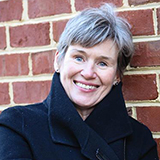Susan Pollart, MD ‘82
 Susan Pollart, MD, is the senior associate dean for faculty affairs and faculty development at the University of Virginia School of Medicine, where she is also the Ruth E. Murdaugh Professor of Family Medicine. She has been a faculty member since 1988, joining the Office of the Dean in 2006. Pollart currently serves as faculty coordinator on the UVA Medical Alumni Association’s Board of Directors.
Susan Pollart, MD, is the senior associate dean for faculty affairs and faculty development at the University of Virginia School of Medicine, where she is also the Ruth E. Murdaugh Professor of Family Medicine. She has been a faculty member since 1988, joining the Office of the Dean in 2006. Pollart currently serves as faculty coordinator on the UVA Medical Alumni Association’s Board of Directors.
Why did you choose to attend medical school at UVA?
I was an out-of-state applicant from West Virginia and was looking at medical schools along the east coast. The day of my interview, I spent the morning at Monticello and the evening, after my interview, walking the Lawn. I applied to UVA because of its outstanding academic reputation but I came to UVA because I fell in love with its history and its beauty.
What led you to your specific area of concentration?
I am really interested in peoples’ stories – in why they do the things they do. Family medicine is all about listening to stories, helping people make sense of difficult physical, emotional, and spiritual situations, and helping them live lives that are as healthy as possible within the context of their unique situation. I am fascinated by the stories of my patients and I am honored that they share them with me.
What was your experience like at the UVA School of Medicine?
Of course medical school was a lot of work but it was also great fun. In many ways, medical school was all of the fun of undergraduate school just in a different location. Who wouldn’t want to get to do college twice? While I don’t see much of my classmates now, I think of them often. I have just two photographs on my office wall – one of my entire class on graduation day and one of the women in our class.
You now wear several professional hats as a senior associate dean, a faculty member, a physician, to name a few. What aspect of your career do you enjoy most and what is your greatest challenge?
The role of dean for the faculty is very much like the role of a family physician. I work with faculty when they are at their best and when they are facing challenges, and I have the opportunity to hear their stories of success and to support and counsel them when there are struggles. It is very rewarding to be included in the professional lives of the talented faculty of the School of Medicine.
The biggest challenge has to be time. There are never enough hours to do all the interesting things that are available!
You’ve recently published research on job satisfaction among physicians in academic medicine. What interested you in this topic and what were the key takeaways?
The research was published with colleagues from across the country who shared an interest in understanding what things drive job satisfaction in academic medicine. The good news is that most of the survey respondents said they were satisfied (or very satisfied) with their job. The most important contributors to that satisfaction seem to be issues in their department (organization, governance, transparency, and focus on mission) as well as relationships with colleagues and the kind of work they get to do.
Another study looking at things that predict clinical faculty member’s intention to leave their medical school found that the biggest predictor was how the faculty felt about how they were spending their time. Those faculty members whose work was divided up among the various medical school missions in a way that was satisfying to them were significantly less likely to say they intend to leave their medical school in upcoming few years.
You serve as the faculty coordinator of the UVA Medical Alumni Association’s Board of Directors. Can you talk about this role and what alumni can do to support faculty at the School of Medicine?
The UVA Medical Alumni Association serves as a vital link between the doctors and medical scientists of today and those of tomorrow. Alumni can support the work of the faculty in all three mission areas of the school. In the educational mission, when alumni accept students into their medical practices, they provide contemporary laboratories for our students to apply the knowledge they learned in the classrooms and clinical spaces of the school. In the research mission, alumni can join with our faculty in clinical research, referring patients for enrollment in clinical trials. And in the clinical mission, our faculty members wish to serve as partners with our alumni, providing support and consultation on challenging patients and new therapies. Finally, alumni financial backing of the professional development of our faculty provides a much-needed support during difficult financial times in academic medicine.
Originally published: April 2015
